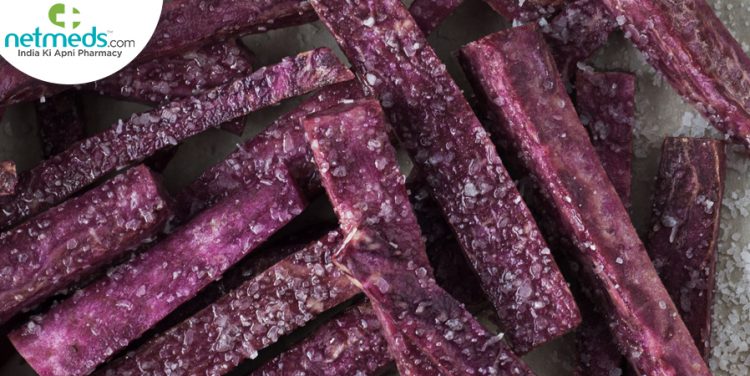They say that rainy days should be spent at home with a cup of tea, some savoury and a good book. Well! Not a bad thought, and we all love the idea, but isn’t it also a terrific time to stock your homes with an array of fresh fruits and vegetables that magnetic monsoon season arrives with?
Besides soothing our heat-depleted nerves, rains ring in multi-coloured veggies, filling our mono-hued platters into vivid ones. Indeed, it is a lovely time to relish colourful capsicums, radishes, leafy greens, gourds, cucumbers, and tomatoes. A rainbow platter can do wonders to your health as it contains colour-laden plant pigments that play a key role in protecting our bodies and fostering good health. Amongst all these sprightly-looking options, a regular intake of purple-coloured fruits and vegetables is an excellent addition to the daily quota of nutrition. Purple and its hues come from a flavonoid called anthocyanin; a phytonutrient responsible for this colour in the plants.
One such vegetable replete with anthocyanin flavonoid is a root vegetable that goes by the botanical name Dioscorea Alata. Commonly referred to as purple yam, ube, greater yam, winged yam, or water yam in English, a staple of MP, it is abundantly found in other parts of India. Due to its nutty, crunchy taste, hot ‘yam chaat’ is relished across the country. It is called ratalu in Hindi, rasa valli kilangu in Tamil, thuppa genasu in Kannada, thoona kerungu in Tulu, kondfal in Marathi and kachil in Malayalam. Purple yam is often confused with taro root as they look similar, but taro root grows from the taro plant, and unlike purple yams, it is not a yam specie.
Also Read: Kanda/Elephant Foot Yam/Suran: Health Benefits, Nutrition, Uses and Recipes
Shop from our wide range of essential vitamin supplements
Health Benefits
This incredibly nutritious root vegetable is loaded with a plethora of health benefits. Besides anthocyanins, it contains potassium, sodium, iron, calcium, Vitamin A, and Vitamin C.
Here are some fabulous health benefits of purple yam:
Eliminates Digestive Issues
Rich in fibre, purple yam is very beneficial for the stomach. The intake of fibre-rich foods clears intestinal dirt and aids digestion. Purple yam benefits all the problems related to the digestive tract.
Cures Oxidative Stress
Purple yam has three times higher antioxidant activity compared to different types of blueberries and other similar coloured veggies. Anthocyanin keeps the body cells in good health and protects the DNA from free radical damage.
Prevents Neurodegenerative Disorders
Purple yams are a great source of Vitamin C, which acts as a potent antioxidant. protecting against oxidative cell damage that is linked to many chronic conditions, such as cancer, heart disease, diabetes, and neurodegenerative disorders.
Alleviates Asthmatic Troubles
Asthma is a chronic inflammatory disease of the airways. A high dietary intake of Vitamin A and C is associated with a reduced risk of asthma. Purple yam consists of a significant amount of both these Vitamins thus curing asthmatic woes.
Boosts Immunity
It contains all essential Vitamins and Minerals that are helpful to aid the body’s immunity. Regular intake of purple yam also helps in the regeneration of the white blood cells in the body that combats infections.
Promotes Gut Health
Purple yams are loaded with complex carbohydrates and a good source of resistant starch that increases the number of Bifidobacteria, a type of beneficial gut bacteria. These bacteria play a vital role in improving gut health aiding the breakdown of such carbs.
What’s More?
These purple versatile tubers have fabulous culinary benefits and are used generously in soups, salads, gravies, and stir-fry. Boiled, mashed, fried, or baked, their nutty flavor is bound to delight your tastebuds.
Try it yourself! Here are these easy recipes made of this lovely lavender vegetable.
Purple Yam Stir Fry
Ingredients:
3 cups thickly cut purple yam strips
3 tbsp oil
Half cup crushed peanuts
2 green chilies
1-inch ginger
Few curry leaves
1 tbsp cumin seeds
Salt and pepper powder to taste
A pinch of sugar
Fresh lemon slices
Freshly cut coriander to garnish
Method:
Steam the cut yam for a few minutes and keep aside
Heat oil in a pan, add cumin seeds and curry leaves
Add chillies and ginger, and stir-fry for a few seconds
Add cooked yam, salt, sugar, pepper, and peanut
Let it mix well
Turn off the heat, add lemon juice and coriander to garnish
Serve hot
Nutrition
The starchy root vegetable is rich in potassium, Vitamin C, and phytonutrients, all of which are important for maintaining good health. The recipe contains peanuts which are an excellent source of biotin, copper, niacin, folate, manganese, and Vitamin E.
Coconut Ginger Purple Yam Soup

Ingredients:
1 red onion
3 Garlic Cloves
1-inch ginger root
2 tbsp butter
500 grams purple yam
200 ml coconut milk
500 ml vegetable stock
Spring onions to taste
A handful of small bits of toasted cashews
Method:
Heat butter in a pot, adding thinly sliced onions, garlic, and fresh ginger
Sizzle all for a few minutes until the onions are soft
Add peeled and cubed purple yam
Pour in the coconut milk and vegetable stock and bring to a boil
Simmer for 15 minutes until the purple yam is tender
Let it cool down
Blend the soup in a blender until smooth
Season the soup with salt and pepper to taste
Garnish it with little coconut milk and cashew nuts
Nutrition:
A delicious soup that tastes sweet, salty, and nutty all at the same time has yam which is loaded with a huge amount of fibre keeping you full for longer. Cashews are rich in Vitamin K and Omega-3 fatty acids. It also contains vegetable stock which is extremely nutrient dense.
Source by www.netmeds.com


